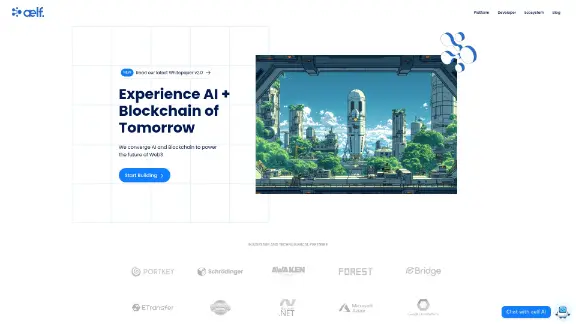aelf (ELF)
Aelf is a decentralized cloud computing blockchain network designed to provide a high-performance platform for implementing blockchain technology in commercial settings. It features multichain parallel processing, resource-isolated smart contract execution through specialized sidechains, and flexibility in consensus protocols. Haobo Ma is the founder and CEO of aelf.
Overview
Established in 2017, aelf is a layer-1 blockchain network recognized for its high performance and cloud-native attributes. It deploys Mainnet nodes across various cloud-computing data centers, creating an environment for smart contracts that supports parallel execution and microservitization on server clusters. The architecture, which includes MainChain and multiple SideChains, ensures efficient network indexing and scalability. Aelf offers solutions for Web3 DApps, providing an operational environment with various infrastructures and developer tools tailored for Web3 applications like DeFi and the Metaverse. It serves as a user-friendly gateway into the metaverse, enhancing speed, efficiency, and cost-effectiveness for users and developers.

| Ticker | ELF |
| Category | Infrastructure |
| Website | https://aelf.com |
| @aelfblockchain | |
| https://www.reddit.com/r/aelfofficial | |
| Contract Addresses | |
|---|---|
| aelf | EL...LF Copied! Copied! |
| ethereum | 0xbf...0e Copied! Copied! |
| tdvv-sidechain | EL...VV Copied! Copied! |
| binance-smart-chain | 0xa3...c9 Copied! Copied! |
Aelf Foundation
Headquartered in Singapore, the aelf Foundation is a non-profit organization that governs aelf's operations. Its primary goal is to promote the development and application of aelf technology, fostering collaboration and supporting corporations and startups in adopting blockchain technology. The foundation is committed to implementing a comprehensive management and governance model in compliance with Singapore's regulatory standards.
AElevate Gaming
AElevate Gaming is a program by aelf designed to assist Web2 gaming studios in transitioning to Web3. It provides financial, technological, and business support to qualifying candidates. The Building Grant, launched in August 2023, focuses on helping applicants construct projects on aelf's sidechain and integrate various decentralized applications (dApps) on the blockchain. This includes incorporating aelf's incubated account abstraction wallet and NFT platform for managing in-game NFTs. Studios benefit from lightweight, open-sourced Software Development Kits (SDKs) tailored for aelf's mainnet, enabling interaction with aelf's mainchain and sidechains. The program facilitates the creation and deployment of smart contracts to govern game mechanics and manage digital assets such as NFTs and tokens.
Aelf Ventures
Launched in September 2023, aelf Ventures is led by crypto experts and supports significant projects in the blockchain industry. The investment strategy focuses on the transition from Web2 to Web3, aiding transformative ventures within aelf and multichain ecosystems. Through strategic and financial investments, aelf Ventures supports the growth of blockchain startups and established crypto enterprises. Notable investments include Crystal Fun and Mythic Protocol, as well as incubated projects like Portkey and eBridge.
ELF Token
ELF tokens are used to cover resource fees within the aelf system, such as smart contract deployment and system operation (transaction fees, cross-chain data transfer fees). They also enable community participation in significant on-chain decisions, including electing mining nodes and introducing new system features.
Tokenomics
The ELF token has a maximum supply of 1 billion tokens, distributed as follows:
- 16% - Team allocation
- 10% - Advisors and partnerships
- 12% - PoS and PoW Rewards
- 25% - Aelf foundation
- 25% - Sale
- 12% - Marketing and airdrops
Governance
Aelf offers three governance models: Parliament, Association, and Referendum. These models enable users, candidate nodes, and production nodes to actively participate in governance, contributing to a more equitable ecosystem.
Parliament Governance: Users vote for production nodes with transactional governance rights. Production nodes govern key matters, starting with a single genesis parliamentary organization.
Association Governance: The platform supports small organizations with specific goals, requiring efficient governance tools for transaction handling. Examples include DAOs. The association governance model addresses these needs.
Referendum Governance: Important decisions impacting user rights involve all users, granting them voting rights. Two models exist: one executes decisions upon meeting conditions, and another allows users to choose options based on preferences.
Aelf DAO
Introduced in December 2022, aelf DAO reshapes governance and growth towards decentralization. Comprising Mainnet ELF token holders, BPs, and ecosystem projects, aelf DAO collaboratively enhances governance mechanisms. Key roles include voters (Mainnet ELF holders) and BPs (block producers). Aelf DAO supports aelf's development through grants and hackathons and plans to evolve into a launchpad fostering Web3 DApps development.
